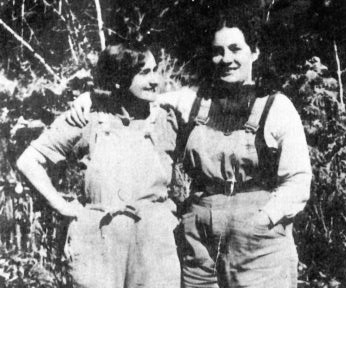EVE LANGLEY is an Australian writer and poet born on this date (d: 1974) in at a cattle station in New South Wales in 1904. Her father was an itinerant farm worker who died when Eve was still a girl, and her mother raised Eve and her sister June while managing a small hotel in Crossover, a small town in Victoria. Although Eve’s education was incomplete, she was, as her biography Joy L. Thwaite, puts it, “a precocious and omniverous reader, a weaver of tales, a haunter of libraries.” By the time she was 20, one of her favorite amusements was to imagine herself the incarnation of some great writer she had been reading, such as John Keats or Francois Rabelais. Eve herself only half-jokingly referred to her reading as a medical treatment: “My early arnicas of Mathew Arnold, small balsams of Wide, Rabelaisian cauterizers, Shavian foments and Shakespearean liniments.”
She had also formed an extravagant passion for Gippsland, the rural area of Victoria where her mother had been raised, and in 1924, she convinced her sister June to head out with her for Gippsland in hopes of getting work picking peas. “Now that we’re going to Gippsland, we said, we must put off our feminine names for ever,” declares the narrator in The Pea Pickers. And, as in the book, Eve and June dressed up in men’s overalls and took to calling themselves “Steve” and “Blue.”
Over the next four years, Steve and Blue made annual trips to Gippsland during the growing season, traveling from farm to farm, living in tents and earning poverty wages hoeing and picking crops. For Langley, the experience seems to have been more like a personal transformation than a youthful adventure. “At some part of the journey, my hereditary Gippsland mind awoke. It was a totally different apparatus to my Dandenongian mind,” she would later write in The Pea Pickers (Dandenong being the fictional stand-in for Crossover).
Eve tried to make a go as a farmer herself, but was too likely to become diverted by her reading and writing to keep a successful crop going. In 1932, she moved to Auckland, New Zealand, where June and her mother had settled. She began getting poems published in literary magazines, but also had a disastrous affair with an Italian car salesman that resulted Eve becoming pregnant and giving the child up for adoption.
Several years later, she became infatuated with an artist named Hilary Clark. Clark was eleven years younger than her and more interested in men than women, but the two ended up marrying and Eve had three children by him over the next four years. (Their names were Bisi Arilev, Langley Rhaviley and Karl Marx.) They were separated and she was keeping the first two children in squalid conditions and pregnant with the third when she began writing The Pea Pickers. She typed it on cheap paper a friend had given her and couldn’t afford to buy a new ribbon when the text began to be illegible. Nevertheless, she finished the book and mailed it off to Sydney as an entry for the S. H. Prior Memorial Prize competition.
Not all the judges were impressed, however, and in the end, the prize for 1940 was split three ways between The Pea Pickers, Kylie Tennant’s novel, The Battlers, and a biography of an early governor of New South Wales, Lachlan Macquarie: His Life, Adventures and Times, by M. H. Ellis. Angus and Robertson took the rights to publish Langley’s novel, but a great deal of editing was required to get the material into publishable shape. They also sold the U. S. rights to by Dutton, which didn’t publish it until 1945, as Not Yet the Moon.
In her latter years she became extremely reclusive, living in a shack in the Katoomba bush in the Blue Mountains. She became increasingly eccentric, wearing ‘mannish clothes’ and a white topi and always wore a knife in her belt. Dale Spender writes that much has been written of her eccentricities, such as the wearing of trousers, and says that “it is distressing to find that sometimes there is more comment about her eccentricities as a person than about the strengths of her writing”. Langley claimed Oscar Wilde as her alter ego, going so far as to officially take that name by deed poll in 1954. Her work presents many clues to her enigmatic life. The manuscripts of ten of her unpublished novels are held among her papers in the Mitchell Library.
Hal Porter wrote in 1965 about many of the writers he had met, and said that “of them all, Eve Langley is the one with whom, on a first meeting, I spent the most dazzling day, enlivened by the unforeseen”.
She spent the last years of her life living alone in the Blue Mountains. She died alone at home sometime between 1 and 13 June, but her body was not found until about 3 weeks after her death.
